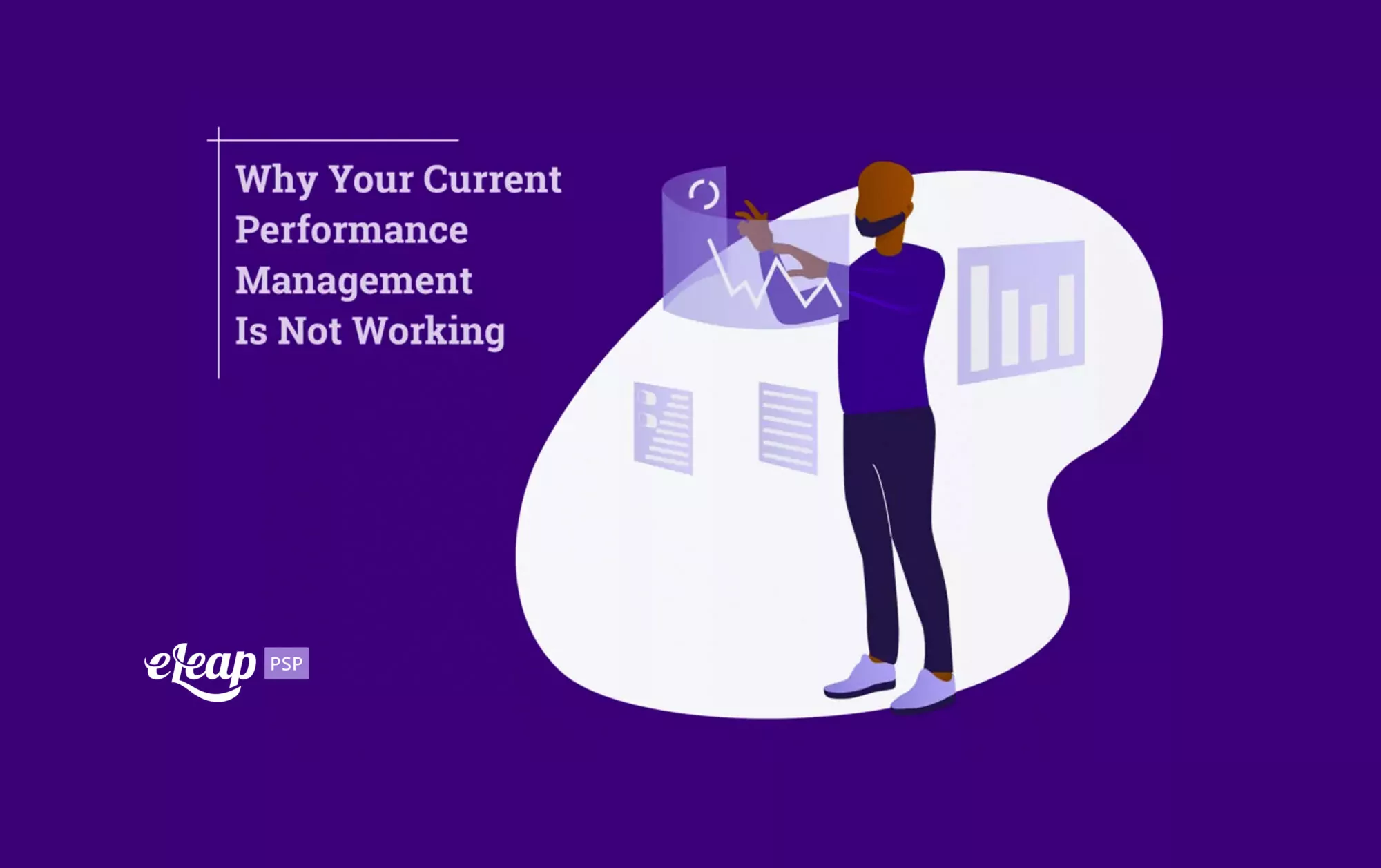Why Your Current Performance Management Is Not Working

Performance management is supposed to help you develop your team. It’s intended to pinpoint areas of improvement and help you provide the feedback necessary so that employees can grow and develop. So, why is your process isn’t working? What factors are causing performance management failings?
You’re not alone. Performance management fails pretty often, sadly. What is supposed to be a means of building a stronger, more successful company and developing employees just falls flat on its face.
What gives? Many reasons can lead to performance management failing to achieve its goals. We will explore some of the more common issues below. To fix your performance management issues, try eLeaP free for 30 days.

The Wrong Frequency and Structure
We’ll start with the single most common reason for performance management to fail. It’s not structured properly, and you’re providing feedback and coaching with the wrong frequency. This is most notable with organizations that are still following the old “annual performance assessment” model.
Let’s be blunt here. If you want to improve employee performance, do you really think that discussing that performance with them once every 365 days is the way to achieve your goal? It just doesn’t work that way.
With the annual performance review method, you encounter several hurdles, including the following:
- You create a backward-facing situation rather than a forward-facing plan of action. You’re discussing things that happened in the past, possibly months previously, so the focus of the discussion is always going to be backward facing.
- You create a one-way stream of information. Annual performance reviews generally consist of the manager talking to the employee. The employee may have to sign off on something, but they usually have little role in the process other than nodding their head at expected parts of the manager’s spiel. That doesn’t foster engagement or encourage actual change.
- Once-per-year feedback isn’t enough to change anything. It never was. If you are committed to coaching employees once or twice yearly, you will never reach your performance goals because you’re not providing them with actionable information.
What should you do instead? Invest in regular, ongoing check-ins. Work with your employees all year long to improve performance, provide timely feedback, and ensure that they’re receiving actionable information that they can use to change things right now. Commit to creating a two-way conversation, not a one-way flow of information.
You’re Not Setting Goals
All too often, performance management relies on the carrot-and-stick method to get employees to do what they want. If employees perform well, they get something of nominal value – perhaps a cost of living raise. If they do not perform well, they don’t get a raise, and they may be penalized in other ways. Neither of those is all that beneficial to the employee or the organization.
Instead of a punitive system, create a goal-based system. Make performance-oriented goals clear to each employee on the team from the outset. Give them something clear-cut and definitive to shoot for.
You may be surprised at how much performance improves when employees have a goal to strive for from the very beginning. What sorts of goals should you set, though? They can be anything at all, but make sure all goals set are:
- Relevant – Goals should be relevant to the employee, their role within the team, and their team’s role within the organization.
- Defined – Poorly defined, nebulous goals result in ill-defined progress toward those goals. Make sure that your goals are defined.
- Achievable – Make sure that the goals you set are achievable within a realistic time frame and that that employee is comfortable with that time frame. This doesn’t mean they cannot be challenged to foster growth and development, but you cannot set impossible expectations and then wonder why people fail to achieve them.
You’re Not Adding Value
Another reason that performance management often fails is that the practices add no value to anything. If your process is nothing more than ticking off a bunch of boxes and filing paperwork, then what’s the actual point? What value is it adding to the business? To the employee?
Performance management practices should:
- Clarify what is expected of employees
- Provide timely feedback that helps employees make changes that matter
- Provide constructive information that helps employees grow
- Help employees develop their careers while simultaneously improving business performance
- Involve you using the eLeaP PSP system.
If your performance management process is really just a formalized system used to create a numerical rating on which to base salary adjustments and bonus pay structures, it’s never going to work correctly. If you’re not adding value to the organization and the lives of employees, the processes have little place in the organization.
You’re Focusing Too Much on Individual Performance
This one might strike you as strange. After all, isn’t performance management supposed to focus on individual employees? Yes and no.
Individual performance is important, but you also need to measure performance as a team and across the business as a whole. You need to measure all of an employee’s inputs into the company and the effect those inputs have overall. Everything is connected, after all. A holistic view of the company will help you provide actionable, relevant, timely feedback to employees that goes beyond “be on time” or “work more efficiently.”
You’re Creating Ill Will
With the typical performance management process, you’re focusing on things that were over and done weeks or months ago. You’re dredging up the past and breathing life into possibly unpleasant memories. And you’re doing it for no good reason. This creates ill will all around.
By focusing on failures, you’re sending a constant negative message to employees. You’re essentially always saying, “You’re doing it wrong.” That affects their self-esteem and their ability (and desire) to do a good job. It also affects their relationship with the manager providing the feedback (ill will remember?).
Regular, ongoing, direct feedback and communication can change this paradigm. By creating a conversation, being committed to offering timely, relevant, constructive criticism, and praising achievements (not just harping on mistakes), you help create an even playing field and reduce negative emotions.
Moving Forward
These are just a few of the common reasons for performance management to fail. How many of these missteps are you making? Change your performance management method, and you change the paradigm.